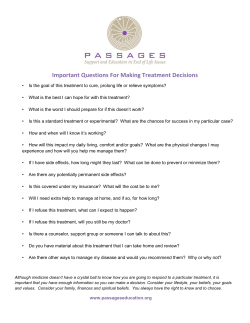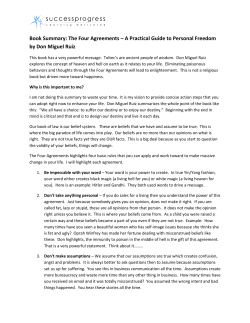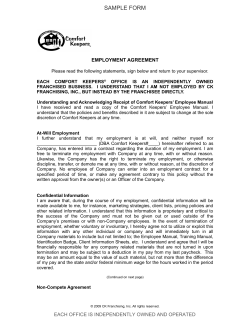
YOUR CHARACTER'S COMFORT ZONE:
YOUR CHARACTER'S COMFORT ZONE: How to Put Him in a Box to Free Him by Sylvie Kurtz We all have comfort zones. That's what tames life's chaos and allows us some degree of feeling in control. Everyone's box comes in a different shape and size, but everyone has one. The same goes for your characters. They "lived" a life that got them to the starting point of your story. It's in that background that you're going to find the information you need to motivate, push your character out of his comfort zone, and redeem him. Your main character is where he is today because of everything he's experienced in his life before. He's sought experiences that supported his values and avoided, resisted, or rejected those that were inconsistent with his existing beliefs. He can probably give a logical reason for why he stays in his situation, because that's what he sees as the truth--even if it's distorted. To protect his beliefs, he's built a wall around his world. His personal comfort zone, his box, allows him to stay the way he is. Once a person believes something, he acts as if it were true. This current level of awareness affects every decision he makes and every action he takes. He's developed a lifestyle to justify the box. He's built and programmed into his subconscious and nervous systems "wrong" responses to life. He's conditioned himself to feel and act and respond in a certain way that allows him to avoid pain. Are these beliefs rational? Most likely, the character isn't even aware of what's truly motivating his behavior. If he were, then he could look at the beliefs logically and break through them. He's doing the best he can with his current way of seeing the world. But that comfortable box makes for a boring story. Forcing him out of his comfort zone will allow you to change his basic pattern, and force him to face his false beliefs. That unwanted push will create the beautiful conflict that makes a good story tick. In turn, the conflict will lead to a new state of awareness that will allow him to change. Yes, he may agree there are things in his life he should change, but really change is for others. So he avoids, resists, and rejects any idea that threatens his beliefs. The "resisting the call to adventure" step of the Hero's Journey often portrays this wall. The conflict of your story will challenge his beliefs and push him to question them. The crisis will force him to reassess his old self-defeating concepts, values, defenses, assumptions or beliefs and come to a new realization, a new awareness. The new awareness will enable him act in a different way to win the final battle. But this outward change can't come without an inward transformation first. If your hero is a loner, start him out in an occupation that naturally allows him to operate as a loner. This guy wouldn't choose to work as a social director of a cruise ship. That would place him in a position of pain too often--the thing he's trying to avoid. No, he'd more likely choose a career as a bookkeeper or run an Internet business or be a forest ranger--something that would give him minimum contact with people. You want to start him in a position where he feels "comfortable," where he feels he understands his world. Even if he doesn't like his situation, it's the devil he knows. Even if you're starting your story with a bang and don't do an "ordinary life" set-up, you need to know this information to set up a strong conflict. Somewhere after the opening action, you'll have a lull where you'll show the beginning of his character arc--the circumstance where he feels the most in control and in balance. Indiana Jones went back to the classroom for a bit so we could see him in his ordinary world. The ordinary world will also show the reader the flaw the character will need to overcome to earn his ending. Once you've shown the reader the character's comfort zone and why it's not working, then you throw a bomb at his ordinary world with your life-changing event (inciting incident, catalyst.) In Spirit of a Hunter, Sabriel's enabling circumstance is working for Seekers, Inc. It allows him to work alone most of the time and, when he has to participate in a team fashion, he always takes the position that allows him to work the most independently. This job allows him to "hide" what he feels is his cowardice (what he thinks he needs to survive.) What he really needs to learn is that everyone has vulnerabilities and that showing them doesn't make you a coward--just a human others can relate to. Nora's enabling circumstance is being part of the Camden family, which allows her to provide for her son, be there for him at all times and be part of a community. On the surface, the Camdens offer her security (what she thinks she needs to survive.) But underneath all that compliance grates against her need to be independent, so she's constantly committing little sins against the rules. What she really needs is to believe in her own strength. In Charley's Web by Joy Fielding, the book starts with Charley receiving email responses to one of her weekly columns. It shows her as being alone, even in the midst of a busy newsroom. We learn that her family hates each other, that she has no friends, that her relationships with men have been short and on her terms, that people don't much like her. This is her ordinary world, the circumstance that allows her to control her feelings of childhood abandonment. If I don't let anyone in, then I can't get my heart broken when they leave. Her job allows her to work on her terms and keep pain (people) at arm's length. We can also see that her coping mechanism is hurting her. We can feel that she longs for friends and for a deep relationship. Here's a movie example. In Just Like Heaven, a montage shows Elizabeth's sleek efficiency and that she deserves to get the attending physician position she wants. Her job at the hospital enables her to stay busy and not make time for deep connections. In a bathroom break, a coworker tells her, "You're lucky. All you have to worry about is your job." And we see by the expression on her face that she would love to have someone to go home to, but something in her can't make the leap. She's a healer in desperate need of nurturing. Self‐healing comes from within, but without pushing your character out of his comfort zone, you can't get him to see there's a better way of thinking out there that will allow him to reach his dreams. © 2010
© Copyright 2025





















